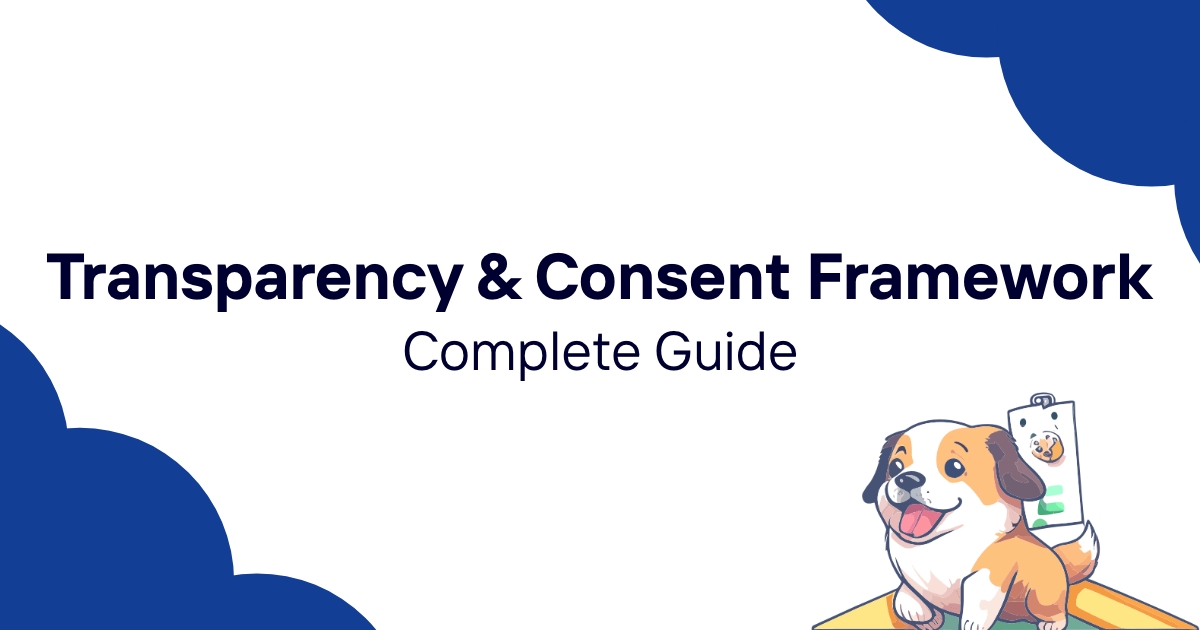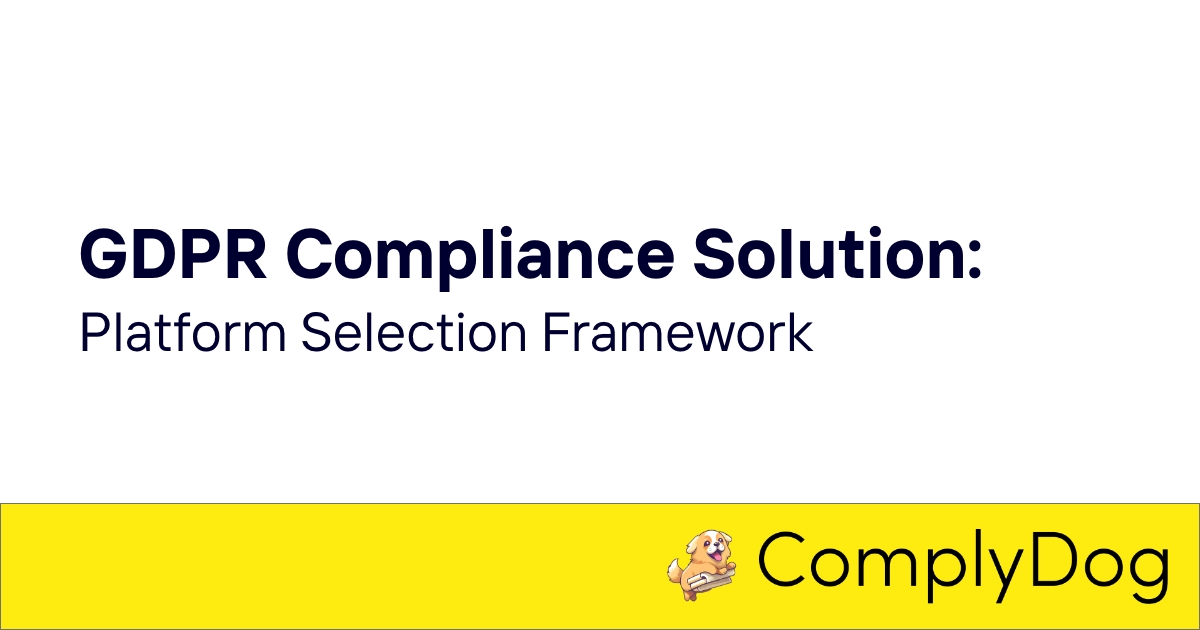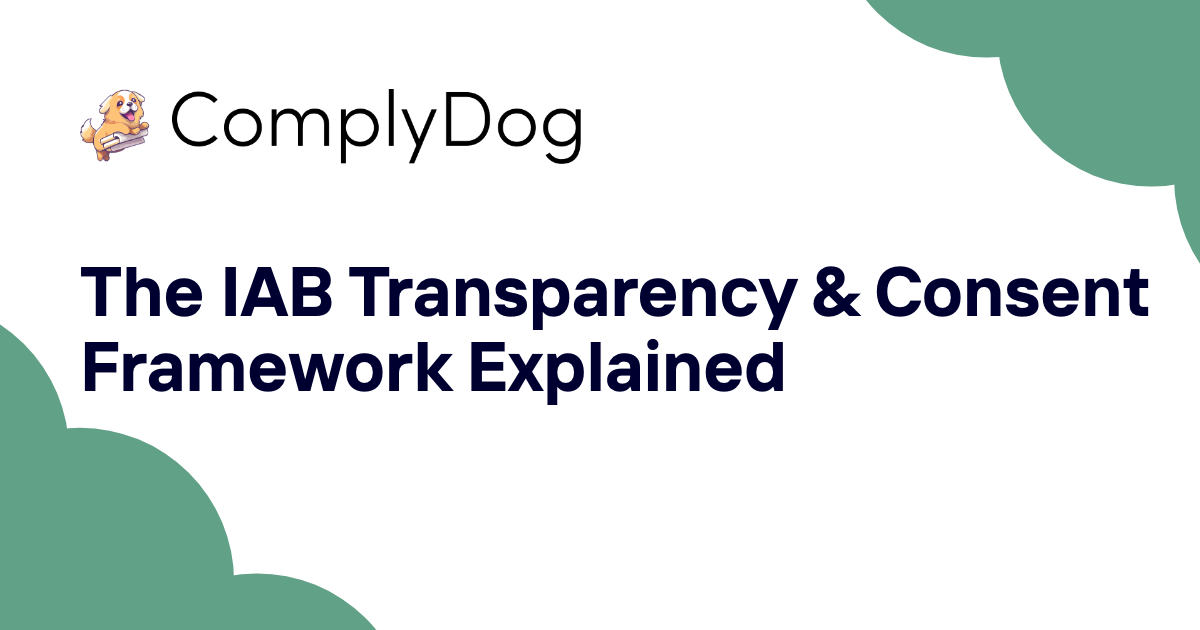The Transparency and Consent Framework (TCF) has become the digital advertising industry standard for managing consent and transparency under GDPR and other privacy regulations. Developed by the Interactive Advertising Bureau (IAB), TCF provides standardized approaches for collecting, storing, and communicating user consent across the complex digital advertising ecosystem.
This comprehensive guide explains TCF fundamentals, implementation requirements, and best practices for publishers, advertisers, and technology vendors. Understanding TCF is essential for organizations participating in programmatic advertising while maintaining compliance with privacy regulations.
What is TCF (Transparency and Consent Framework)?
The Transparency and Consent Framework (TCF) is an industry standard developed by the Interactive Advertising Bureau (IAB) to help digital advertising stakeholders comply with GDPR and other privacy regulations through standardized consent management and transparency mechanisms.
TCF Purpose and Objectives
TCF addresses fundamental challenges in digital advertising consent management:
Standardized Consent Communication: TCF provides uniform methods for communicating user consent across different platforms, vendors, and advertising technologies.
Transparency Requirements: The framework ensures users receive clear, comprehensive information about data processing activities in digital advertising ecosystems.
Industry Coordination: TCF enables coordination between publishers, advertisers, ad tech vendors, and other stakeholders in complex advertising supply chains.
Regulatory Compliance: The framework helps organizations meet GDPR requirements while maintaining viable digital advertising business models.
User Control: TCF empowers users with granular control over their data and privacy preferences across advertising environments.
TCF Evolution and Versions
TCF has evolved through multiple versions to address changing requirements and industry feedback:
TCF v1.1: Initial framework release providing basic consent string functionality and vendor registration processes.
TCF v2.0: Major update introducing enhanced transparency, granular consent controls, and improved user experience requirements.
TCF v2.2: Current version with refinements for regulatory compliance, technical improvements, and vendor ecosystem enhancements.
Future Development: Ongoing development addressing emerging privacy regulations, technology changes, and industry feedback.
TCF Ecosystem Participants
Multiple stakeholder types participate in the TCF ecosystem:
Publishers: Website and app owners who display advertising and collect user consent through TCF-compliant consent management platforms.
Consent Management Platforms (CMPs): Technology providers that implement TCF specifications and manage consent collection and storage.
Vendors: Advertising technology companies, data processors, and other service providers registered in the TCF vendor list.
Advertisers: Companies that purchase advertising inventory and rely on TCF consent for targeted advertising campaigns.
Regulatory Bodies: Data protection authorities that oversee TCF compliance within broader privacy regulation frameworks.
TCF Technical Architecture
TCF operates through standardized technical components that enable consent communication:
Global Vendor List (GVL): Centralized registry of advertising technology vendors with detailed information about their data processing activities.
Consent Strings: Encoded data strings that communicate user consent decisions across different platforms and vendors.
Consent Management Platforms: Certified platforms that implement TCF specifications and provide consent collection interfaces.
API Specifications: Standardized programming interfaces that enable consent information sharing between different systems.
Transparency Information: Structured data about vendor processing activities that enables informed user consent decisions.
IAB TCF Requirements and Standards
The Interactive Advertising Bureau establishes comprehensive requirements and standards that govern TCF implementation across the digital advertising ecosystem.
TCF Compliance Requirements
Organizations participating in TCF must meet specific compliance obligations:
Vendor Registration: Advertising technology companies must register in the Global Vendor List with detailed information about their data processing activities.
Consent Collection: Publishers must implement TCF-compliant consent management that provides users with required transparency and control.
Consent Respect: All ecosystem participants must respect user consent decisions and process data only within granted permissions.
Transparency Provision: Vendors must provide clear, comprehensive information about their data processing purposes and legal bases.
Technical Implementation: Platforms must implement TCF technical specifications correctly to ensure interoperability across the ecosystem.
Global Vendor List (GVL) Standards
The GVL maintains standardized information about advertising technology vendors:
Vendor Information: Comprehensive details about each vendor including company information, contact details, and privacy policy links.
Purpose Declarations: Standardized descriptions of data processing purposes that vendors may use within the advertising ecosystem.
Legal Basis Specification: Clear indication of legal bases (consent, legitimate interest, etc.) that vendors rely on for different processing activities.
Special Feature Declarations: Information about special data processing features like cross-device linking or geolocation processing.
Data Retention Periods: Standardized information about how long vendors retain different types of personal data.
Consent Management Platform (CMP) Certification
CMPs must meet rigorous certification requirements to participate in TCF:
Technical Compliance: Correct implementation of all TCF technical specifications including consent string generation and API functionality.
User Interface Standards: Consent interfaces that meet TCF requirements for clarity, granularity, and user control.
Certification Process: Regular certification and recertification processes that verify ongoing compliance with TCF standards.
Performance Requirements: Technical performance standards that ensure consent collection doesn't negatively impact user experience.
Audit and Monitoring: Ongoing monitoring and audit processes that verify continued compliance with TCF requirements.
TCF Policy Framework
TCF operates within comprehensive policy frameworks that govern participant behavior:
Consent Policies: Detailed requirements for collecting, storing, and processing user consent within the TCF ecosystem.
Transparency Policies: Standards for providing users with clear, comprehensive information about data processing activities.
Vendor Obligations: Specific obligations for advertising technology vendors participating in the TCF ecosystem.
Publisher Responsibilities: Requirements for publishers implementing TCF-compliant consent management systems.
Enforcement Mechanisms: Processes for addressing non-compliance and maintaining ecosystem integrity.
Regulatory Alignment
TCF standards align with major privacy regulations while addressing industry-specific requirements:
GDPR Compliance: Comprehensive alignment with GDPR requirements for consent, transparency, and individual rights.
ePrivacy Directive: Consideration of ePrivacy requirements particularly regarding cookies and electronic communications.
National Implementation: Adaptation to different national implementations of EU privacy directives across member states.
International Considerations: Flexibility for implementation across different international privacy regulatory frameworks.
Future Regulation: Framework design that can adapt to emerging privacy regulations and enforcement guidance.
TCF Implementation for Publishers
Publishers play a central role in TCF implementation by collecting user consent and ensuring compliance across their digital properties.
CMP Selection and Integration
Publishers must choose and implement appropriate consent management platforms:
CMP Evaluation: Assessment of different certified CMPs based on functionality, user experience, and integration capabilities.
Technical Integration: Implementation of CMP code on websites and mobile applications following TCF technical specifications.
Customization Options: Configuration of consent interfaces to match brand requirements while maintaining TCF compliance.
Performance Optimization: Ensuring CMP implementation doesn't negatively impact page load times or user experience.
Mobile Implementation: Special considerations for implementing TCF compliance in mobile applications and responsive web designs.
Consent Interface Design
User-facing consent interfaces must meet specific TCF requirements:
Transparency Requirements: Clear presentation of information about data processing purposes, vendors, and user rights.
Granular Controls: User interface elements that enable granular consent for different purposes and vendors.
Withdrawal Mechanisms: Easy-to-use methods for users to withdraw consent and modify their preferences.
Accessibility Standards: Consent interfaces that are accessible to users with disabilities and across different devices.
Multi-Language Support: Consent interfaces in appropriate languages for international user bases.
Vendor Management
Publishers must manage relationships with advertising technology vendors within TCF frameworks:
Vendor Selection: Choosing advertising technology partners based on their TCF registration and compliance status.
Consent Scope Management: Ensuring vendor data processing activities align with collected user consent.
Vendor Communication: Regular communication with vendors about consent status and user preference changes.
Compliance Monitoring: Ongoing monitoring of vendor compliance with TCF requirements and user consent decisions.
Contract Integration: Incorporating TCF requirements into contracts with advertising technology vendors.
Data Flow Management
Publishers must understand and manage data flows within TCF frameworks:
Consent Signal Transmission: Ensuring user consent decisions are properly communicated to all relevant vendors and platforms.
Real-Time Updates: Managing real-time updates to consent status and ensuring immediate compliance across the advertising ecosystem.
Cross-Domain Coordination: Coordinating consent across multiple domains and subdomains within publisher portfolios.
Third-Party Integration: Managing consent for third-party content, widgets, and embedded advertising technologies.
Audit Trail Maintenance: Maintaining comprehensive records of consent collection and transmission for compliance verification.
As outlined in our GDPR compliance solution framework guide, implementing TCF requires systematic approaches that address both regulatory compliance and business objectives.
TCF Vendor Integration Guide
Advertising technology vendors must integrate with TCF systems to participate in the consent-based advertising ecosystem while maintaining compliance with privacy regulations.
Vendor Registration Process
Advertising technology companies must complete comprehensive registration to participate in TCF:
Global Vendor List Application: Detailed application process including company information, data processing activities, and compliance commitments.
Purpose Declaration: Specification of data processing purposes using standardized TCF purpose definitions and categories.
Legal Basis Documentation: Clear indication of legal bases (consent, legitimate interest) for different data processing activities.
Technical Integration Planning: Documentation of how vendor technologies will integrate with TCF consent management systems.
Compliance Verification: Demonstration of ability to respect user consent decisions and maintain TCF compliance.
API Integration Requirements
Vendors must implement TCF APIs correctly to receive and process consent information:
Consent String Processing: Correct interpretation of TCF consent strings to determine user consent status for specific processing activities.
Real-Time Consent Checking: Implementation of real-time consent verification before processing personal data.
Consent Scope Validation: Verification that data processing activities align with specific consent grants from users.
API Performance: Efficient API implementation that doesn't introduce significant latency into advertising transactions.
Error Handling: Robust error handling for consent string processing and API communication failures.
Data Processing Compliance
Vendors must ensure their data processing activities comply with granted consent:
Purpose Limitation: Processing personal data only for purposes that align with user consent grants.
Consent Validation: Real-time validation of consent status before initiating any personal data processing activities.
Data Minimization: Collecting and processing only personal data necessary for consented purposes.
Retention Compliance: Managing data retention periods in accordance with consent grants and TCF requirements.
Sharing Restrictions: Ensuring data sharing with other parties complies with user consent and TCF vendor obligations.
Technical Implementation Best Practices
Effective vendor implementation requires attention to technical details and performance:
Consent Caching: Appropriate caching of consent information to improve performance while maintaining real-time compliance.
Fallback Mechanisms: Implementation of fallback procedures when consent information is unavailable or unclear.
Monitoring and Logging: Comprehensive logging of consent processing activities for audit and compliance verification.
Testing and Validation: Systematic testing of TCF integration across different scenarios and use cases.
Performance Optimization: Ensuring TCF compliance doesn't negatively impact advertising transaction performance.
Compliance Monitoring and Reporting
Vendors must maintain ongoing compliance and provide appropriate reporting:
Consent Respect Monitoring: Ongoing monitoring to ensure data processing activities align with current user consent status.
Compliance Reporting: Regular reporting on TCF compliance status and consent processing activities.
Audit Preparation: Maintaining documentation and systems that support regulatory audits and compliance verification.
Issue Resolution: Procedures for identifying and resolving consent compliance issues quickly.
Continuous Improvement: Ongoing optimization of TCF implementation based on performance data and regulatory guidance.
TCF Consent String Management
Consent strings form the technical foundation of TCF by encoding user consent decisions in standardized formats that enable communication across the advertising ecosystem.
Consent String Structure and Format
TCF consent strings encode complex consent information in standardized formats:
Binary Encoding: Efficient binary encoding that represents consent decisions for multiple vendors and purposes.
Version Information: Consent string versioning that ensures compatibility across different TCF implementations.
Vendor Consent Encoding: Specific encoding methods for representing consent decisions for individual vendors.
Purpose Consent Encoding: Standardized encoding of consent for different data processing purposes.
Legitimate Interest Encoding: Separate encoding for legitimate interest objections and consent decisions.
Consent String Generation
Consent management platforms must generate valid consent strings following TCF specifications:
User Interface Integration: Converting user consent decisions from interface interactions into properly formatted consent strings.
Validation Processes: Ensuring generated consent strings comply with TCF format specifications and contain valid data.
Performance Optimization: Efficient consent string generation that doesn't impact user experience or page performance.
Error Handling: Robust error handling for consent string generation failures and validation issues.
Version Management: Appropriate handling of TCF version transitions and consent string format updates.
Consent String Transmission
Consent strings must be transmitted securely and efficiently across the advertising ecosystem:
Cookie Storage: Storing consent strings in browser cookies with appropriate security and accessibility settings.
API Transmission: Transmitting consent strings through programmatic advertising APIs and real-time bidding systems.
Cross-Domain Sharing: Mechanisms for sharing consent strings across different domains within publisher portfolios.
Mobile Application Integration: Special considerations for consent string management in mobile applications.
Performance Considerations: Optimizing consent string transmission to minimize impact on advertising transaction speed.
Consent String Processing
Advertising technology vendors must correctly process consent strings to determine compliance:
Parsing and Validation: Correct parsing of consent string format and validation of data integrity.
Consent Decision Extraction: Extracting specific consent decisions relevant to vendor data processing activities.
Real-Time Processing: Efficient processing that enables real-time consent checking during advertising transactions.
Caching Strategies: Appropriate caching of consent information to improve performance while maintaining compliance.
Update Handling: Processing consent string updates and ensuring immediate compliance with changed user preferences.
Consent String Lifecycle Management
Consent strings require ongoing management throughout their lifecycle:
Expiration Handling: Managing consent string expiration and renewal processes according to TCF requirements.
Update Procedures: Procedures for updating consent strings when users modify their preferences.
Storage Management: Appropriate storage and cleanup of historical consent strings for audit and compliance purposes.
Synchronization: Ensuring consent string consistency across different systems and platforms.
Backup and Recovery: Backup procedures for consent strings and recovery processes for system failures.
TCF Compliance Verification
Comprehensive compliance verification ensures TCF implementations meet regulatory requirements and industry standards while maintaining ecosystem integrity.
Technical Compliance Testing
TCF implementations require systematic technical validation:
Consent String Validation: Verification that consent strings are properly formatted and contain valid data according to TCF specifications.
API Functionality Testing: Testing of all TCF API implementations to ensure correct functionality and performance.
Integration Testing: Comprehensive testing of TCF integration with existing advertising technology and website systems.
Performance Testing: Validation that TCF implementation doesn't negatively impact page load times or user experience.
Cross-Browser Compatibility: Testing across different browsers, devices, and operating systems to ensure consistent functionality.
User Experience Compliance
TCF compliance includes specific user experience requirements:
Interface Transparency: Verification that consent interfaces provide required transparency about data processing activities.
Granular Control Verification: Testing that users can exercise granular control over consent for different purposes and vendors.
Withdrawal Functionality: Verification that consent withdrawal mechanisms work correctly and are easily accessible.
Accessibility Testing: Testing consent interfaces for accessibility compliance and usability across different user groups.
Multi-Language Validation: Verification of consent interface functionality across different languages and cultural contexts.
Vendor Compliance Monitoring
Ongoing monitoring ensures vendors maintain compliance with TCF requirements:
Consent Respect Verification: Monitoring vendor data processing activities to ensure alignment with user consent decisions.
Purpose Limitation Compliance: Verification that vendors process data only for declared purposes with appropriate consent.
Data Sharing Compliance: Monitoring vendor data sharing practices to ensure compliance with consent grants and TCF requirements.
Retention Period Compliance: Verification that vendors maintain appropriate data retention periods according to TCF declarations.
Legal Basis Compliance: Monitoring vendor reliance on different legal bases and ensuring appropriate consent collection.
Audit and Documentation
Comprehensive audit capabilities support regulatory compliance and accountability:
Consent Records: Detailed records of consent collection, storage, and processing activities for audit purposes.
Compliance Documentation: Comprehensive documentation of TCF implementation decisions and compliance measures.
Audit Trail Management: Detailed audit trails of all consent-related activities and system changes.
Regulatory Reporting: Capability to generate reports required by data protection authorities and regulatory examinations.
Third-Party Audits: Support for independent audits of TCF compliance and privacy practices.
Continuous Compliance Monitoring
Ongoing monitoring ensures sustained compliance as systems and regulations evolve:
Automated Monitoring: Automated systems that continuously monitor TCF compliance across different systems and vendors.
Alert Systems: Alert mechanisms that notify appropriate personnel of potential compliance issues or system problems.
Performance Metrics: Key performance indicators that track TCF compliance effectiveness and identify optimization opportunities.
Regulatory Updates: Monitoring of regulatory changes and TCF specification updates that affect compliance requirements.
Improvement Processes: Systematic processes for identifying and implementing compliance improvements based on monitoring results.
TCF vs GDPR Alignment
Understanding the relationship between TCF and GDPR ensures organizations use the framework effectively while maintaining comprehensive regulatory compliance.
GDPR Consent Requirements
TCF aligns with specific GDPR consent requirements while addressing advertising industry needs:
Freely Given Consent: TCF mechanisms that ensure consent is freely given without coercion or negative consequences for withdrawal.
Specific Consent: Granular consent options that enable specific consent for different processing purposes and vendors.
Informed Consent: Comprehensive transparency about data processing activities that enables truly informed consent decisions.
Unambiguous Consent: Clear consent mechanisms that provide unambiguous indication of user agreement to data processing.
Withdrawal Rights: Easy withdrawal mechanisms that make consent withdrawal as simple as giving consent.
Individual Rights Support
TCF implementation must support broader GDPR individual rights beyond consent:
Access Rights: Integration with systems that can provide individuals with access to their personal data across advertising ecosystems.
Rectification Rights: Procedures for correcting inaccurate personal data collected through advertising technologies.
Erasure Rights: Implementation of data deletion capabilities that respect right to be forgotten requests.
Portability Rights: Capability to provide personal data in structured formats when portability rights apply.
Objection Rights: Mechanisms for processing objections to data processing based on legitimate interests.
Accountability and Documentation
TCF compliance contributes to broader GDPR accountability requirements:
Processing Records: TCF documentation contributes to comprehensive records of processing activities required by GDPR Article 30.
Legal Basis Documentation: Clear documentation of legal bases for advertising data processing activities.
Data Protection Impact Assessments: Integration of TCF compliance into DPIAs for advertising and marketing activities.
Vendor Management: TCF vendor management as part of broader third-party processor compliance.
Audit Support: TCF compliance documentation that supports broader GDPR compliance audits and regulatory examinations.
Regulatory Enforcement Alignment
TCF compliance supports broader regulatory compliance strategies:
Authority Cooperation: Alignment with data protection authority guidance and enforcement priorities.
Cross-Border Compliance: TCF implementation that supports international data transfer compliance.
Sectoral Integration: Integration of TCF compliance with other sectoral regulations affecting advertising.
Enforcement Response: TCF compliance as part of broader regulatory enforcement response strategies.
Best Practice Adoption: Using TCF as foundation for broader privacy best practice adoption.
TCF Implementation Best Practices
Successful TCF implementation requires systematic approaches that balance regulatory compliance with business objectives and user experience.
Strategic Implementation Planning
Effective TCF implementation requires comprehensive strategic planning:
Stakeholder Alignment: Early engagement of legal, technical, business, and vendor stakeholders in implementation planning.
Phased Deployment: Staged implementation that builds capability progressively while managing risk and complexity.
Business Impact Assessment: Evaluation of TCF implementation impact on advertising revenue, user experience, and operational efficiency.
Resource Planning: Appropriate allocation of technical, legal, and project management resources for successful implementation.
Timeline Management: Realistic timeline development that accounts for technical complexity and vendor coordination requirements.
Technical Implementation Excellence
Technical excellence ensures sustainable and compliant TCF implementation:
Performance Optimization: Implementation approaches that minimize impact on page load times and user experience.
Integration Testing: Comprehensive testing of TCF integration with existing advertising technology and analytics systems.
Monitoring Implementation: Robust monitoring systems that track TCF performance and compliance across all digital properties.
Backup and Recovery: Appropriate backup procedures for consent data and recovery processes for system failures.
Documentation Maintenance: Comprehensive technical documentation that supports ongoing maintenance and compliance verification.
User Experience Optimization
Positive user experience enhances both compliance and business outcomes:
Interface Design: Consent interfaces that are clear, user-friendly, and aligned with overall website design and branding.
Performance Impact: Minimizing consent collection impact on page performance and overall user experience.
Educational Content: Clear explanations that help users understand their choices and the value of different consent decisions.
Preference Management: User-friendly preference centers that enable ongoing consent management and modification.
Feedback Integration: Systems for collecting and acting on user feedback about consent experiences.
Ongoing Compliance Management
Sustained compliance requires systematic ongoing management:
Regular Audits: Periodic audits of TCF implementation and compliance across all digital properties and vendor relationships.
Vendor Monitoring: Ongoing monitoring of vendor compliance with TCF requirements and user consent decisions.
Regulatory Updates: Systematic tracking of TCF specification updates and regulatory guidance affecting implementation.
Performance Monitoring: Continuous monitoring of TCF performance impact on business metrics and user experience.
Continuous Improvement: Regular optimization of TCF implementation based on performance data, user feedback, and regulatory developments.
Building effective TCF compliance requires combining technical expertise with regulatory knowledge and user experience design. The most successful implementations treat TCF as a foundation for broader privacy excellence rather than a minimum compliance requirement.
For organizations seeking to implement comprehensive privacy compliance that includes TCF alongside broader regulatory requirements, integrated approaches often provide better results than managing TCF in isolation from other privacy obligations.
Ready to implement comprehensive privacy compliance that includes TCF and broader regulatory requirements? Use ComplyDog and get integrated privacy management that addresses TCF compliance alongside GDPR, cookie management, and comprehensive data protection in a unified platform designed for sustainable compliance and business success.


















